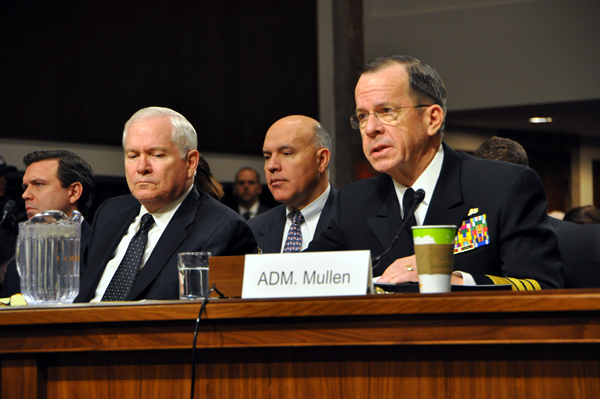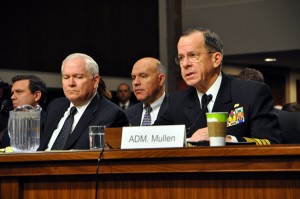National
Pentagon working with gay groups on ‘Don’t Ask’ review
Defense officials seek advice, are ‘open and inclusive’

Gay organizations working to end “Don’t Ask, Don’t Tell” are enjoying an open relationship with the Pentagon working group reviewing the law as they continue to express concerns about the study deviating from its purpose.
Defense Secretary Robert Gates and Chairman of the Joint Chiefs of Staff Adm. Michael Mullen established the working group following a Feb. 2 hearing on Capitol Hill as a way to examine how to implement an end to “Don’t Ask, Don’t Tell,” should Congress repeal the law. The work is expected to be completed Dec. 1.
Alex Nicholson, executive director of Servicemembers United, said his organization has had a positive engagement with the working group since its inception.
“They brought us in — in the very beginning — to initially brief us on what they were planning to do, to answer any questions we had,” he said. “They were very open and inclusive, but not only to us. They were that way with our opposition as well.”
In one such conversation, Nicholson said the working group held a conference call to answer questions about the new regulations that were instituted last month to relax the implementation of “Don’t Ask, Don’t Tell.”
“There was a little bit of a worry, I think, in the beginning that maybe them bringing us in, being so open in answering questions, was a one-time, token gesture,” Nicholson said. “I’m pleased to say now it’s my impression that those worries, at least so far, have been unfounded. The working group has a primary point of contact for us within the Department of Defense, and that point of contact has been extremely open and extremely available.”
Nicholson said Servicemembers United first spoke with someone at the working group to express concern about the group’s mandate and noted it would set a bad precedent to poll the force on potential policy changes.
“The working group responded to that by telling us that the terms of reference have been issued, they are what they are and they don’t have control over them,” he said.
In a second round of suggestions, Nicholson said Servicemembers United passed along some ideas for the methodology the working group could institute to examine how to implement repeal. Some of the recommendations, he noted, were to advise against town hall meetings and focus groups to poll the force.
“Focus groups are a bad idea because of the phenomena of group think and posturing,” he said. “On any perceived controversial issue, you’re going to get a much a different set of answers if you ask people about it in a group rather than asking them one on one.”
Aubrey Sarvis, executive director of the Servicemembers Legal Defense Network, also said his organization’s staff have had weekly conversations and meetings with the working group.
“I think it’s been positive, ongoing,” he said. “It’s not a process that we asked for, or that we think is needed, but we’re dealing with the reality that it’s in place and we’re going to do everything that we can to make it work and have a positive contribution.”
In these conversations, Sarvis said SLDN has been recommending voices and organizations that work to end the ban on open service.
Another organization that has engaged with the working group is the Palm Center, a think tank on gays in the military at the University of California, Santa Barbara. Nathaniel Frank, a Palm Center research fellow, said he’s had a “good relationship” with the Pentagon working group.
“They’ve reached out to us consistently and they’ve been responsive to us and I’m impressed by that,” he said. “The question will be, obviously, what are the results of the study and how are they expressed. So that proof will be in the pudding.”
Frank said the working group has asked the Palm Center to make recommendations on a litany of issues, including how to identify the costs to the military of “Don’t Ask, Don’t Tell.”
“That doesn’t mean just financial costs,” he said. “It means a litany of costs to morale, recruitment, cohesion, the impact on GLB service members, and Palm is coming out with a memo that I’m finalizing now that tries to convey all of those costs.”
Frank said the working group also asked about the pitfalls of using focus groups; how to measure the views of military families; and how to empirically assess the impact of lifting the ban on unit cohesion.
Another item that Frank said he was asked about was getting the views of gay service members for the study without putting them at risk for discharge under “Don’t Ask, Don’t Tell.”
This challenge has been repeatedly discussed in hearings on Capitol Hill and among those seeking repeal. In a statement released last week, Army Secretary John McHugh said the Pentagon is “likely” to employ a third party to solicit those views.
Sarvis said his understanding is the Pentagon is considering the use of a professional consultant or pollsters who have worked with the Pentagon before on manpower issues.
“In addition, I think they’re also looking to the RAND Corp. as part of that engagement,” he said.
But the decision on how the Defense Department will obtain these views is apparently not yet final. Cynthia Smith, a Pentagon spokesperson, said in a statement to DC Agenda on April 9 that the working group is still considering the best way to incorporate gay service members into the study.
“Getting the views of gay and lesbian service members is very important to the working group,” she said. “We are still in the process of developing the proper instrument to obtain this information from gay and lesbian service members currently serving.”
Frank said he would take issue with any decision from the Pentagon to use a third party to solicit the views of gay service members because it would create a situation where service members generally would speak to one group, and gay, lesbian and bisexual service members would talk to another.
“Uniform personnel … would be consulting service members generally and then they would employ civilians or a third party only to speak to known gays and lesbians,” he said. “There’s an unfairness there in having the military speak directly to straight service members and not to gay service members.”
A better solution, Frank said, would be for the Pentagon to issue new regulations that would enable all service members to speak to the working group without fear of being discharged under “Don’t Ask, Don’t Tell.”
“The only consistent way to do it is to apply that uniformly to all people and not have separate standards, which is obviously the problem with the policy as it is,” he said.
Even with the openness between these groups and Pentagon officials, some repeal advocates say they have concerns about the working group’s direction.
Gates has repeatedly said the purpose of the group will be to examine how to implement an end to the ban should Congress repeal the law during the Senate hearing in February. But some repeal advocates say there’s a lack of clarity.
Nicholson said he has “big concerns” about the direction the group is heading, recalling testimony that Jeh Johnson, head of the Pentagon’s Office of General Counsel and co-chair of the group, gave before the House in March in which the results of the working group would inform how Congress would proceed on the issue.
“And that, I think, was very dangerous and was a new twist,” he said. “If the mission of the working group is to simply come up with an effective implementation management plan for after repeal takes effect, then there really should be no reason why Congress should need to wait for the outcome of the working group.”
Frank also acknowledged “some confusion” about whether the purpose of the working group is to study how to lift the ban or whether to lift the ban.
“I think the reason for that confusion is while the group says it’s studying how to lift the ban, given the strategic intention of the president, whether the ban is actually lifted is in the hands of the Congress,” Frank said. “So if the group comes out with a study that exaggerates the risks to cohesion, or other risks associated with lifting the ban, obviously, that will make it easier for obstructionists in Congress to try to block repeal.”
Frank called on leaders handling the group to “make it more clear that they are assessing how best to lift the ban” and note that the only reason they’re evaluating repeal is to determine how to mitigate any harm.
“It’s important to say that years and years of research across the board make clear that that impact will be negligible or non-existent, and most of us already know that,” he said.
Nicholson was particularly critical of the White House and said he thinks it’s “extremely concerning” President Obama hasn’t come out and clarified the study’s purpose. Nicholson noted that he’s been asking for clarification from the White House for several weeks now and hasn’t received a response.
“I just felt like with the working group, they’ve been very much great in communicating with us, been very receptive, I do get the impression that they’re honestly considering the suggestions we give to them,” he said. “The White House, on the other hand, it’s felt like we’ve been throwing suggestions down a black hole.”
Nicholson said he doesn’t think that White House officials are seriously considering his organization’s input and that “they ignore a lot of us for weeks at a time sometimes.”
“Unfortunately, the White House is not only not listening to or considering our suggestions and communicating with us, but they haven’t given any indication that they intend to clarify the position of the working group or curtail the expansion of its scope,” he said.
Shin Inouye, a White House spokesperson, disputed the notion that the White House wasn’t engaged with the Servicemembers United.
“The White House is actively engaged with Servicemembers United and other groups on many issues of interest to the LGBT community, including ‘Don’t Ask, Don’t Tell,'” he said in a statement.
But Sarvis said he thinks the group will stay on track with its mission as long as it adheres to its mandate and stays focused on implementing open service.
“If they move away from their mandate, if they get into polling on if or whether, or seeking the personal opinions of service members, then, yes,” he said, “I think we have a problem.”
U.S. Supreme Court
Supreme Court to consider bans on trans athletes in school sports
27 states have passed laws limiting participation in athletics programs

The U.S. Supreme Court on Thursday agreed to hear two cases involving transgender youth challenging bans prohibiting them from participating in school sports.
In Little v. Hecox, plaintiffs represented by the ACLU, Legal Voice, and the law firm Cooley are challenging Idaho’s 2020 ban, which requires sex testing to adjudicate questions of an athlete’s eligibility.
The 9th U.S. Circuit Court of Appeals described the process in a 2023 decision halting the policy’s enforcement pending an outcome in the litigation. The “sex dispute verification process, whereby any individual can ‘dispute’ the sex of any female student athlete in the state of Idaho,” the court wrote, would “require her to undergo intrusive medical procedures to verify her sex, including gynecological exams.”
In West Virginia v. B.P.J., Lambda Legal, the ACLU, the ACLU of West Virginia, and Cooley are representing a trans middle school student challenging the Mountain State’s 2021 ban on trans athletes.
The plaintiff was participating in cross country when the law was passed, taking puberty blockers that would have significantly reduced the chances that she could have a physiological advantage over cisgender peers.
“Like any other educational program, school athletic programs should be accessible for everyone regardless of their sex or transgender status,” said Joshua Block, senior counsel for the ACLU’s LGBTQ and HIV Project. “Trans kids play sports for the same reasons their peers do — to learn perseverance, dedication, teamwork, and to simply have fun with their friends,” Block said.
He added, “Categorically excluding kids from school sports just because they are transgender will only make our schools less safe and more hurtful places for all youth. We believe the lower courts were right to block these discriminatory laws, and we will continue to defend the freedom of all kids to play.”
“Our client just wants to play sports with her friends and peers,” said Lambda Legal Senior Counsel Tara Borelli. “Everyone understands the value of participating in team athletics, for fitness, leadership, socialization, and myriad other benefits.”
Borelli continued, “The U.S. Court of Appeals for the Fourth Circuit last April issued a thoughtful and thorough ruling allowing B.P.J. to continue participating in track events. That well-reasoned decision should stand the test of time, and we stand ready to defend it.”
Shortly after taking control of both legislative chambers, Republican members of Congress tried — unsuccessfully — to pass a national ban like those now enforced in 27 states since 2020.
Federal Government
UPenn erases Lia Thomas’s records as part of settlement with White House
University agreed to ban trans women from women’s sports teams

In a settlement with the Trump-Vance administration announced on Tuesday, the University of Pennsylvania will ban transgender athletes from competing and erase swimming records set by transgender former student Lia Thomas.
The U.S. Department of Education’s Office for Civil Rights found the university in violation of Title IX, the federal rights law barring sex based discrimination in educational institutions, by “permitting males to compete in women’s intercollegiate athletics and to occupy women-only intimate facilities.”
The statement issued by University of Pennsylvania President J. Larry Jameson highlighted how the law’s interpretation was changed substantially under President Donald Trump’s second term.
“The Department of Education OCR investigated the participation of one transgender athlete on the women’s swimming team three years ago, during the 2021-2022 swim season,” he wrote. “At that time, Penn was in compliance with NCAA eligibility rules and Title IX as then interpreted.”
Jameson continued, “Penn has always followed — and continues to follow — Title IX and the applicable policy of the NCAA regarding transgender athletes. NCAA eligibility rules changed in February 2025 with Executive Orders 14168 and 14201 and Penn will continue to adhere to these new rules.”
Writing that “we acknowledge that some student-athletes were disadvantaged by these rules” in place while Thomas was allowed to compete, the university president added, “We recognize this and will apologize to those who experienced a competitive disadvantage or experienced anxiety because of the policies in effect at the time.”
“Today’s resolution agreement with UPenn is yet another example of the Trump effect in action,” Education Secretary Linda McMahon said in a statement. “Thanks to the leadership of President Trump, UPenn has agreed both to apologize for its past Title IX violations and to ensure that women’s sports are protected at the university for future generations of female athletes.”
Under former President Joe Biden, the department’s Office of Civil Rights sought to protect against anti-LGBTQ discrimination in education, bringing investigations and enforcement actions in cases where school officials might, for example, require trans students to use restrooms and facilities consistent with their birth sex or fail to respond to peer harassment over their gender identity.
Much of the legal reasoning behind the Biden-Harris administration’s positions extended from the 2020 U.S. Supreme Court case Bostock v. Clayton County, which found that sex-based discrimination includes that which is based on sexual orientation or gender identity under Title VII rules covering employment practices.
The Trump-Vance administration last week put the state of California on notice that its trans athlete policies were, or once were, in violation of Title IX, which comes amid the ongoing battle with Maine over the same issue.
New York
Two teens shot steps from Stonewall Inn after NYC Pride parade
One of the victims remains in critical condition

On Sunday night, following the annual NYC Pride March, two girls were shot in Sheridan Square, feet away from the historic Stonewall Inn.
According to an NYPD report, the two girls, aged 16 and 17, were shot around 10:15 p.m. as Pride festivities began to wind down. The 16-year-old was struck in the head and, according to police sources, is said to be in critical condition, while the 17-year-old was said to be in stable condition.
The Washington Blade confirmed with the NYPD the details from the police reports and learned no arrests had been made as of noon Monday.
The shooting took place in the Greenwich Village neighborhood of Manhattan, mere feet away from the most famous gay bar in the city — if not the world — the Stonewall Inn. Earlier that day, hundreds of thousands of people marched down Christopher Street to celebrate 55 years of LGBTQ people standing up for their rights.
In June 1969, after police raided the Stonewall Inn, members of the LGBTQ community pushed back, sparking what became known as the Stonewall riots. Over the course of two days, LGBTQ New Yorkers protested the discriminatory policing of queer spaces across the city and mobilized to speak out — and throw bottles if need be — at officers attempting to suppress their existence.
The following year, LGBTQ people returned to the Stonewall Inn and marched through the same streets where queer New Yorkers had been arrested, marking the first “Gay Pride March” in history and declaring that LGBTQ people were not going anywhere.
New York State Assemblywoman Deborah Glick, whose district includes Greenwich Village, took to social media to comment on the shooting.
“After decades of peaceful Pride celebrations — this year gun fire and two people shot near the Stonewall Inn is a reminder that gun violence is everywhere,” the lesbian lawmaker said on X. “Guns are a problem despite the NRA BS.”





















